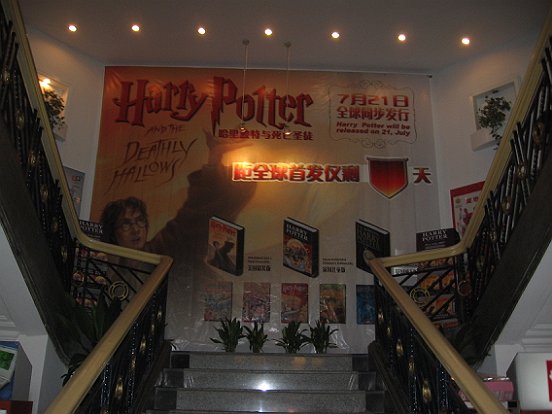|
Historically, the translation of foreign ideas into Chinese has nearly always involved some level of sinification. (This term means to come under the influence of China or make something Chinese in nature.) The problem has been "how to select certain Chinese terms, written characters already vested with established meanings, and invest them with new significance without letting the foreign ideas be subtly modified, in fact, sinified, in the process."[1] For example, when Buddhists texts were being translated into Chinese after the fall of the Han Dynasty (206 B.C.E.-220 C.E.), the Chinese word dao, already in use by Daoists to mean "the way," was used at different times for the Indian words for dharma, yoga, and enlightenment. The Daoist word for inaction was used to denote the Indian word for Nirvana. As a consequence, it was inevitable that Buddhism would take on a distinctively Chinese form.[2] The Harry Potter books are replete with culture-specific names, places, spells and objects which present Chinese translators with a formidable challenge. For example, dragons--a persistent danger and adversary in Western folklore--in China are associated with water, agriculture, and imperial prestige.[3] Many of the spells in Harry Potter are pronounced in Latin or mock Latin. The cosmology of Harry Potter seemed so western that some thought the books could never be popular in China. "All this talk of sorcerers, spells and phantasms is from the Western literary tradition,'' said Chen Xiaomei, an editor of the Chinese Readers News. "It won't be as successful as in the west."[4] But the Harry Potter that emerged from translation did resonate with Chinese readers. "Translators drew on China's 2,500-year-old tradition of ghost stories and current pulp martial arts fiction. For Harry's magical spells, they alluded to incantations legendary kung-fu masters recited before fighting."[5] More significant is their rendering of Mudblood. By comparison, Japanese translators retained the racial connotation of this word choosing a phrase that denotes impure or tainted blood in quite abusive terms, an interesting choice in light of the history of modern Japanese nationalism. In China, however, the translators used a word (种) which primarily means type or kind.[6] Without the explicit connection to race, Harry Potter's world is much more likely to address the clash of traditional and global cultures so many Chinese youth are experiencing. As one Chinese-American put it, Harry's friends showed him "another way to participate in both worlds without having to deny a part of himself. . . We do not have to segregate our private and public lives anymore. We can instead meld them into true multicultural living, both for our children’s sake and for our own."[7] The Harry Potter books are indeed signifiers of globalization in China. But they may very well be mitigating the cultural tensions inherent in the process of globalization, at least for China's youngest generation. |
 As we saw in the last section, Rowling's
use of the word Mudblood seems to link the prejudices of the novel to the
racial discriminations of our own world. But for the Chinese, the issues raised by globalization are more cultural than racial. Interestingly though, the nature
of the Chinese language and the process of interpretation render the experiences
of Harry Potter more germane to the lives of urban Chinese youth than they do in
their original English.
As we saw in the last section, Rowling's
use of the word Mudblood seems to link the prejudices of the novel to the
racial discriminations of our own world. But for the Chinese, the issues raised by globalization are more cultural than racial. Interestingly though, the nature
of the Chinese language and the process of interpretation render the experiences
of Harry Potter more germane to the lives of urban Chinese youth than they do in
their original English.
